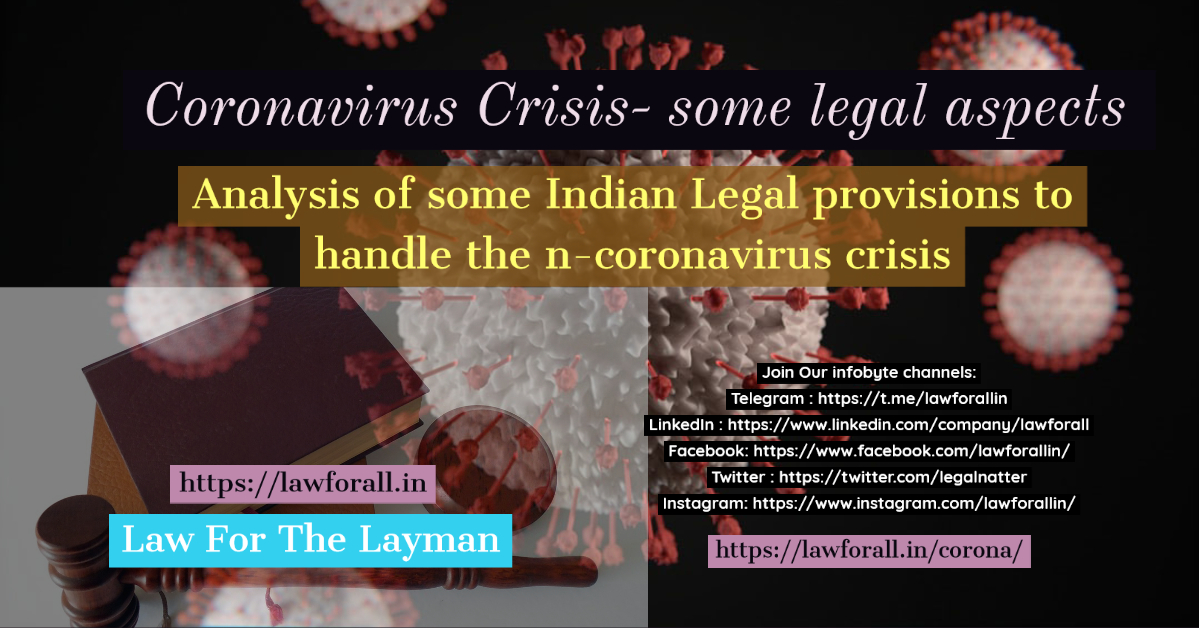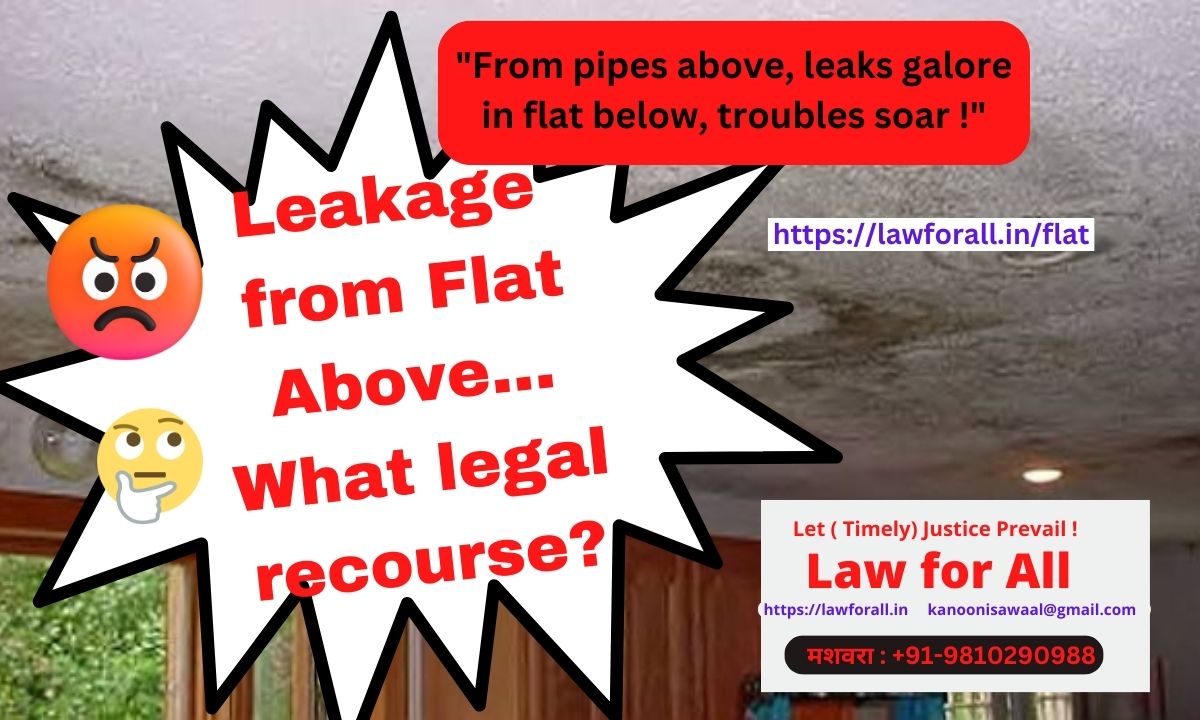
The novel Coronavirus has been declared a pandemic in India.
UPDATE 25th March 2020
The Government of India has, for the first time, invoked the National Disaster Management Act (NDMA) . While health is a State subject in India, this invocation brings all states under Centre’s control for all steps pertaining to the battle against coronavirus.
NDMA has wider ranging powers and provisions than the Epidemic Diseases Management Act 1897 that was so far being invoked. Centre can make national plans , and can take action against anyone obstructing their implementation. The NDMA Chairperson ( The Prime Minster ) can seek ” men or material resources” across the entire country or specific parts of the country to respond to the disaster / emergency. At state level, state disaster management authority chairpersons have similar powers. The intent is to shorten the bureaucratic processes and delays herein. Section 65 of the Act elaborates upon the same.
Sections 51 to 60 of the Act ( in chapter X) describe various offenses and penalties under the Act (NDMA).
Per Section 51, anyone found obstructing any officer or employee of Central / State Government / NDMA from performing his/her functions under the Act, or refuses to comply with directions given under the Act will be imprisoned for a term which may extend to one year or fined, or be both. And if such obstruction or refusal to comply with directions results in loss of lives or imminent danger thereof, shall be punished with imprisonment for a term which may extend up to two years.
Section 52 of the NDMA makes punishable making any false claim to get relief from Government or NDMA. The punishment is upto two years imprisonment and fine.
Section 53 makes it an offense to misappropriate any money or materials meant for relief efforts for own use or for sale. This can lead to imprisonment of up to two years, along with a fine.
Per Section 54, making / circulating false alarms and warnings regarding severity of a disaster, leading to panic, is punishable with imprisonment of upto one year and/or fine.
Section 55 provides that Government officials may also be prosecuted for offenses under the Act.
Section 56 provides a punishment of upto one year and/or fine for any Government official that ceases or refuses to perform his/her duty without a lawful reason.
Section 57 provides punishment of any order made under Section 65. The punishment is one year and/or fine.
Section 58 provides for procedures if an offense is committed by a Company.
Section 59 provides that Government permission needs to be taken first for prosecution of any offense purportedly under Section 55 and Section 56, and Section 60 provides the procedure for any Court to take cognizance of an offense committed under the act.
All the above provisions are in addition to the recourse already available under different laws as described herein.
As I write this ( 23 March 2020, 4 PM ), total number of novel coronavirus (or n-coronavirus, termed more simply as coronavirus usually, though the latter is the genus of which the former is just one specie, the disease it causes being abbreviated as COVID) cases in India is 415 with 30 fresh cases reported. Seventy five cities including Delhi, Mumbai, Kolkata, Chennai and Bengaluru are into complete lockdown till 31 March. Trains, metros and inter-state buses have been shut and only only essential services like milk, vegetables, medicines, grocery and ATMs are available.
The Epidemic Diseases Act 1897 stands invoked all over India and states are already declaring regulations inline with the same. Many actions are being taken under the same, as well as other provisions of other acts, such as the Indian Penal Code.
Still, maybe out of ignorance ( or habit ?) people on the street seem unaware of what these provisions – and other legal provisions- mean, how are they to be followed and penalties for non-compliance. It is hoped that this article will help all appreciate the gravity of the situation , as well as the legal provisions being used to tackle it.
The Epidemic Diseases Act 1897 was enacted to tackle Bubonic Plague in Bombay ( as then known ) State. It empowers the local authorities with quite wide-ranging powers, besides providing them immunity from prosecution for any actions they take. they make. Some may say that in some ways it gives the State almost unfettered powers to implement decisions fast. It is a very small Act- only four sections. But has immensely wide-ranging ramifications. There have been very few state-specific amendments / repeals and it can be said to hold over all India presently. While Section 1 generally indicates areas of India where the Act is applicable, the remaining acts are as under.
Section 2 : Power to take special measures and prescribe regulations as to dangerous epidemic disease.
(1)When at any time the State Government is satisfied that the State or any part thereof is visited by, or threatened with, an outbreak of any dangerous epidemic disease, the State Government, if it thinks that the ordinary provisions of the law for the time being in force are insufficient for the purpose, may take, or require or empower any person to take, such measures and, by public notice, prescribe such temporary regulations to be observed by the public or by any person or class of persons as it shall deem necessary to prevent the outbreak of such disease or the spread thereof, and may determine in what manner and by whom any expenses incurred (including compensation if any) shall be defrayed.
(2) In particular and without prejudice to the generality of the foregoing provisions, the State Government may take measures and prescribe regulations for—
(a) Omitted
(b)the inspection of persons traveling by railway or otherwise, and the segregation, in hospital, temporary accommodation or otherwise, of persons suspected by the inspecting officer of being infected with any such disease.
As can be readily understood from above, anybody may be subject to “inspection” and consequent “segregation” at any time, based only upon a suspicion by the inspecting officer. Further, the inspecting officer – and all other officers acting under the Act are immune from any act of done (or intended to be done in good faith) by them, as is clear from Section 4 of the Act hereunder.
The Central Government is empowered to inspect all ships leaving /arriving and detain any person therein, as is clear from Section 2A hereunder.
Section 2A : Powers of Central Government
When the Central Government is satisfied that India or any part thereof is visited by, or threatened with, an outbreak of any dangerous epidemic disease and that the ordinary provisions of the law for the time being in force are insufficient to prevent the outbreak of such disease or the spread thereof, the Central Government may take measures and prescribe regulations for the inspection of any ship or vessel leaving or arriving at any port in the territories to which this Act extends and for such detention thereof, or of any person intending to sail therein, or arriving thereby, as may be necessary.
Penalties for disobedience of the provisions of this Act are set out in Section 3 as hereunder.
Section 3 : Penalty
Any person disobeying any regulation or order made under this Act shall be deemed to have committed an offence punishable under section 188 of the Indian Penal Code (45 of 1860).
Section 4: Protection to persons acting under Act
No suit or other legal proceedings shall lie against any person for anything done or in good faith intended to be done under this Act.
So , in order to understand the ONLY punishment prescribed under the Act, we have to see Section 188 of the Indian Penal Code.
Section 188 of the Indian Penal Code states :
Disobedience to order duly promulgated by public servant.
Whoever, knowing that, by an order promulgated by a public servant lawfully empowered to promulgate such order, he is directed to abstain from a certain act, or to take certain order with certain property in his possession or under his management, disobeys such direction, shall, if such disobedience causes or tends to cause obstruction, annoyance or injury, or risk of obstruction, annoyance or injury, to any persons lawfully employed, be punished with simple imprisonment for a term which may extend to one month or with fine which may extend to two hundred rupees, or with both;
and if such disobedience causes or tends to cause danger to human life, health or safety, or causes or tends to cause a riot or affray, shall be punished with imprisonment of either description for a term which may extend to six months, or with fine which may extend to one thousand rupees, or with both.
Explanation
It is not necessary that the offender should intend to produce harm, or contemplate his disobedience as likely to produce harm. It is sufficient that he knows of the order which he disobeys, and that his disobedience produces, or is likely to produce, harm.
Illustration
An order is promulgated by a public servant lawfully empowered to promulgate such order, directing that a religious procession shall not pass down a certain street. A knowingly disobeys the order, and thereby causes danger of riot. A has committed the offence defined in this section.
So, maximum punishment under this section ( and the Epidemic Diseases Act) is six months imprisonment ( that can be simple or rigorous) and a fine of Rs. 1000/=. One may wonder if this is sufficient deterrent in present times !
Previous instances of the Act’s Invocation
The Act has been invoked before. For instance:
2009 : Section 2 was used in Pune during outbreak of swine flu. Swine flu was declared a notificable disease and screening centres opened.
2015 : During outbreak of Malatria and Dengue in Chandigarh, the Act was invoked and officers instructed to ensure the issuance of notices and challans of Rs 500 to offenders.
2018 : Khedkarmsiya village in Waghodia taluk ( Vadodara Distric of Gujarat ) was declared via a notification under the Act as cholera-affected after 31 persons complained of symptoms of the disease.
And now, on March 12, 2020, under this law, the Lt Governor of Delhi has notified the “Delhi Epidemic Diseases, COVID-19, Regulations, 2020”. Some of its salient points are :
- Provisions of testing in all hospitals using ‘Flu-Corners’ for suspected corona virus cases.
- During such testing, prior travel history of the person to be recorded to any country / area where COVID-19 has been reported, or if the person has come in contact with any suspected or confirmed case of COVID-19. Specific quarantine / isolation protocols described.
- No unauthorized dissemination of COVID information in print or electronic media.
- Private Laboratories prohibited from directly testing for COVID, samples to be routed through Nodal Authority.
- Right to coercive surveillance, inspection, inquiry and examination.
- Mandatory notification obligation on health professionals.
Criticism and scope for misuse
In 1897, freedom fighter Bal Gangadhar Tilak was imprisoned for 18 months under this Act for his newspaper Kesari‘s anti-establishment coverage of the plague.
Some have held that the National Disaster Management Act of 2005 (NDMA) is clearer and more purposeful. They state that “Although India has a number of legal mechanisms to support public health measures in an epidemic situation, they are not being addressed under a single legislation. The Epidemic Act 1897 is a century old blunt act which needs a substantial overhaul to counter the rising burden of infectious diseases both new and old. Issues like definition of epidemic disease, territorial boundaries, ethics and human rights principles, empowerment of officials, punishment, etc., need more deliberations and warrant a relook. “
Other Provisions
The Act is not only tool authorities have in situations such as at present. Some other provisions, mainly of the Indian Penal Code (IPC) include:
- Many of sections of Chapter VIIIa ( of Offences against public tranquility) of the Indian Penal Code may be used. For instance, provisions of S. 141 to S. 144, 147, 149 may be used. Section 144 ( curfew) is well known even to the layman and has altready been promulgated at many places.
- S. 188 (Disobedience to order duly promulgated by public servant) provides for a maximum imprisonment of six months and fine of a thousand rupees.
- S. 269 (Negligent act likely to spread infection of disease dangerous to life) provides for six months imprisonment and fine, while S. 270 (Malignant act likely to spread infection of disease dangerous to life) is punishable with imprisonment for a term which may extend to two years, or with fine, or with both.
- S. 271 ( Knowingly disobeying any quarantine rule) Imprisonment for 6 months, or fine, or both.
Besides the Epidemic Disease Act, there are several other rules that can be enforced during a health emergency like the Essential Commodities Act, NLEM, Municipal corporation acts, state public health acts etc. which provide for various measures to ensure orderly public life and relief during a health emergency.
Some recent legal actions taken
These include :
- An FIR was registered against a man in Arunachal Pradesh for allegedly posting misleading information on social media regarding the outbreak
- A chemist was booked for selling N95 masks at over four times higher than the fixed price in Himachal Pradesh’s Kangra district
- Lucknow police lodged an FIR against Bollywood singer, Kanika Kapoor for alleged negligence in compliance of necessary directives post her return from London.
While above – and more – legal provisions exist, and no doubt more will be enforced as the situation develops, it is paramount obligation of every resident – not only for the country but for themselves as well as their immediate family – to take very seriously the instructions and precautions being disseminated almost every minute by the State. Of course there are many other legal aspects to wrestle with- fundamental rights, issues of privacy etc. for example. But as is clearly set out by the above, public protection and benefit precedes them in these times.
So, take precautions, be safe as well as avoid legal tangles !
This article is provided for information purpose only and does not create any legal relationship whatsoever. Further, law is a complex and ever-changing subject and so information herein may be out-dated or may not apply to a specific case. Always take proper legal counsel.
Contact Us for more information and discussions.
We are also on :
LinkedIn : https://www.linkedin.com/company/lawforall
Facebook: https://www.facebook.com/lawforallin/
Twitter : https://twitter.com/legalnatter
Instagram: https://www.instagram.com/lawforallin/


